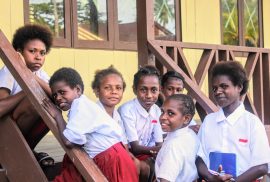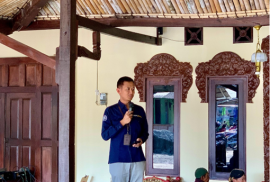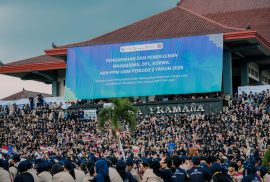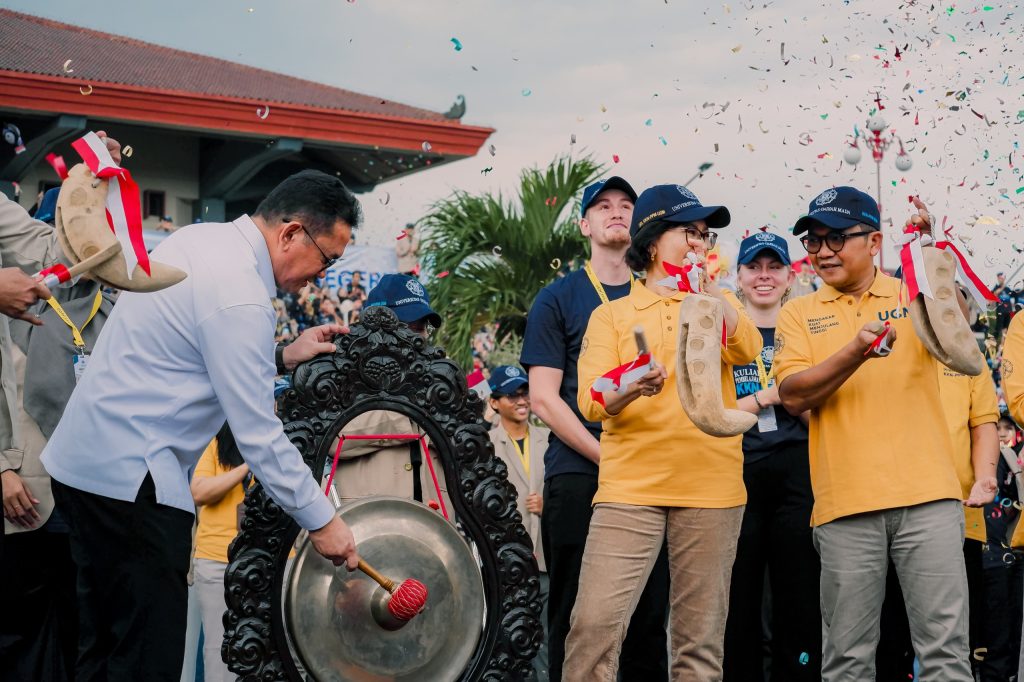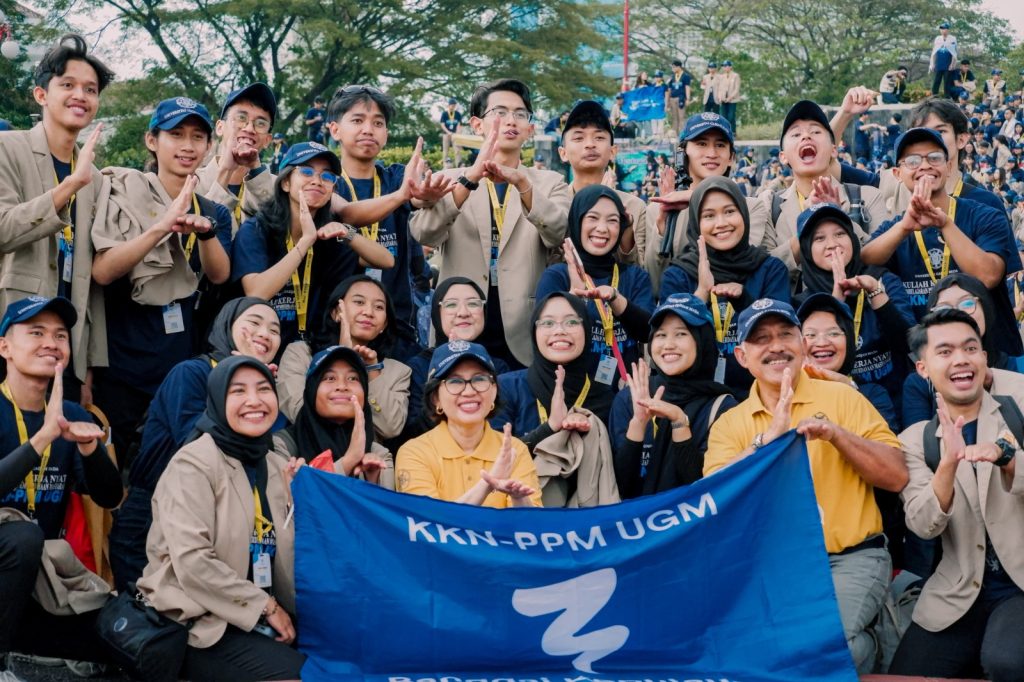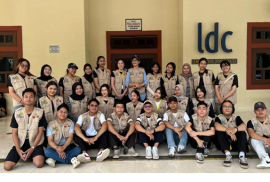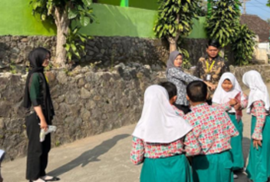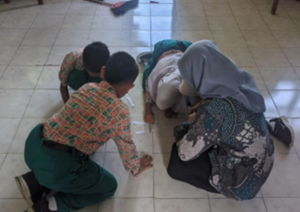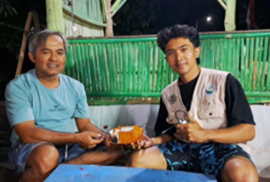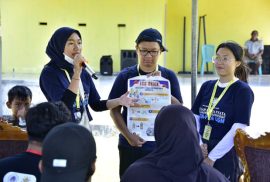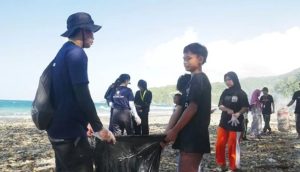Not many have heard of Atuka, a small remote village tucked away in Central Mimika District, Mimika Regency, Papua. Located near the eastern edge of Indonesia, reaching this village requires a long and winding journey: a flight from Yogyakarta to Timika, followed by a one-and-a-half-hour drive to Pomako Port, and finally a two-hour boat ride upstream on a wooden canoe before arriving in Atuka.
Our main mission was to conduct monitoring and evaluation of Universitas Gadjah Mada (UGM)’s KKN-PPM community service program currently being held in the area. But once we set foot in Atuka, we realized this was far more than a routine work trip. Atuka held stories, faces, and lessons that moved us in ways we never anticipated.
 |
We were warmly welcomed by the local community and UGM students stationed in Atuka. The sky stretched bright and blue over the village, unmarred by pollution or noise. With no motorized vehicles in sight, people in Atuka walk everywhere. Footpaths blend into nature—accompanied by sea breezes and the cheerful laughter of children playing on a grassy field.
We arrived at the student lodging after a long journey, where the UGM students kindly offered us steamed buns and green coconut cakes—whose names, admittedly, we forgot to ask. As we sat and rested, we exchanged stories about their progress, challenges, and everyday life in Atuka. A few young children curiously peeked at us from the porch, shyly giggling when the students invited them to join the conversation.
As the sun began to sink westward, the students took us on a walk around the village. We followed narrow paths cutting through wooden stilt houses. Partway through our walk, seawater slowly crept onto the roads—a natural occurrence that happens every afternoon in Atuka. Unprepared, we removed our shoes and walked barefoot. The students, now accustomed to the phenomenon, were ready with their rubber sandals.
 |
Along the way, children and residents greeted us with curious smiles. “Good afternoon,” they’d say warmly as we passed. Some waved from their porches while we carried our damp shoes. We returned the greetings with smiles and gratitude. Often, we greeted them first, a small gesture of respect.
As we walked, the students explained what they had learned about life in Atuka—from sacred boundary lines that must not be crossed, to how the community survives with minimal access to modern amenities, and the deep-rooted challenges in education.
Electricity in Atuka only runs for six hours a day, from 6 PM to midnight. While many of us can’t imagine life without 24/7 electricity, for Atuka’s residents, lighting at night is all they need. Clean water is another challenge. Rainwater is collected for daily use since the groundwater is mixed with seawater. During our stay, the rain hadn’t fallen for days, so we fetched water from a communal tank with buckets just to bathe and wash.
Life in Atuka is shaped by limitation. Meals aren’t about choices, but survival. Many villagers eat plain white rice just to fill their stomachs. “One child here told us that he sometimes sprinkles coffee powder over rice to add flavor,” shared a UGM student. Nutritious meals are a luxury. On good days, they catch karaka (crab) during low tide for dinner. But even in limitation, the people of Atuka live with resilience. This is the life they know—regardless of how outsiders perceive it.
Eventually, we reached Atuka Elementary School, where infrastructure-focused UGM students were installing a Rainwater Harvesting System (IPAH), one of their key projects. The school was chosen to ensure the water source would be accessible to all.
 |
Though the system was still being assembled, we continued to the junior high school at the edge of the village. Children played soccer and traditional games on the field, their laughter ringing in the air. We sat with the teachers, who shared heartfelt stories.
 |
Pak Siswa, one of the teachers, explained that out of 50 students, only about 15 continued to senior high school. The rest stopped. “Parents here don’t see education as essential,” he said. “Many would rather their children go fishing or crab hunting to help feed the family.” To them, school is a distant luxury, not a necessity.
 |
Hearing this tightened something in our chest. In other places, children dare to dream big. But here, not every child even gets the chance to stay in school.
As dusk approached, we said goodbye to the teachers and returned to the student lodging. Across the street stood the Mimika Tengah District Office. While it offered the only functioning public toilet, the office itself sat quiet and unused—the staff working remotely from home. Inside, desks and shelves were coated in dust, a gentle but sobering reminder of untapped public resources.
Later, we shared a simple dinner with the students. There are no food stalls in Atuka, so they had cooked kangkung (water spinach) and reheated rendang we brought from Yogyakarta. The food, though modest, felt special in the warmth of community. Over dinner, we chatted casually about their upcoming return to Java.
That evening, Papi Leo, the village elder lovingly called “Papi” by the students, visited as he always did. Every day, he checked in to make sure they were okay. He shared how he had gone into town to collect a village stipend. The trip cost more than he received. “But Papi is still happy,” he smiled.
Papi also shared his thoughts on the students: “Their presence feels like a dream. I never imagined a remote village like ours could welcome them. I’m overjoyed that these young people chose to live and spend time with us,” he said. “They didn’t just bring knowledge, but kindness and attention. That’s what matters most.”
The District Head later expressed hope that UGM’s community service program would expand beyond Atuka to reach other nearby villages. For him, the students had rekindled something vital in the community—energy, color, and hope.
For the students, this wasn’t just about fulfilling a university requirement. It was a powerful life lesson. “Living here has taught me so much about sharing and the meaning of enough,” said Fatasya, a student from the Vocational School. “Things we often take for granted can be considered luxuries elsewhere.”
That night, before sleeping, we were reminded to wear socks. The students warned us about tiny bugs called agas that bite at night, especially around the feet. We saw firsthand how the students had endured itchy, even wounded skin. Our hearts ached for them, but we also admired their spirit.
The next morning, we waited for the water level to rise before the boat could carry us back. As we prepared to leave, the students and children came to send us off. There were handshakes, waves, and smiles that hid tears. It was hard to say goodbye. We left with full hearts and quiet prayers, hoping everyone there stays safe and well.
Prof. Ir. Nanung Agus Fitriyanto, Ph.D., Head of UGM’s KKN Subdirectorate and the leader of our group, expressed how special this visit had been. This was UGM’s first-ever KKN program in Mimika—almost at the easternmost point of Indonesia. He felt proud of the students who had traveled so far, bringing knowledge and genuine care. “I hope this isn’t the last. May many more meaningful journeys follow.”
 |
As our boat drifted away, we looked back with heavy hearts. Not all corners of Indonesia enjoy the same privileges. In Atuka, life is simple, technology isn’t a necessity, and people find joy in little things. That’s the real lesson: that life is about enough, about helping each other, and about finding meaning in simplicity.
That day, we didn’t just conduct a monitoring visit. It became a mirror for reflection—reminding us that what we often overlook are the very things worth cherishing.
Until we meet again, Atuka. A small village far from the city’s noise, but rich in sincerity, simplicity, and hope. Thank you for welcoming us, even if only for a short while. Our footprints may fade with the tide, but your memories will stay with us for a long, long time.
author: bil

